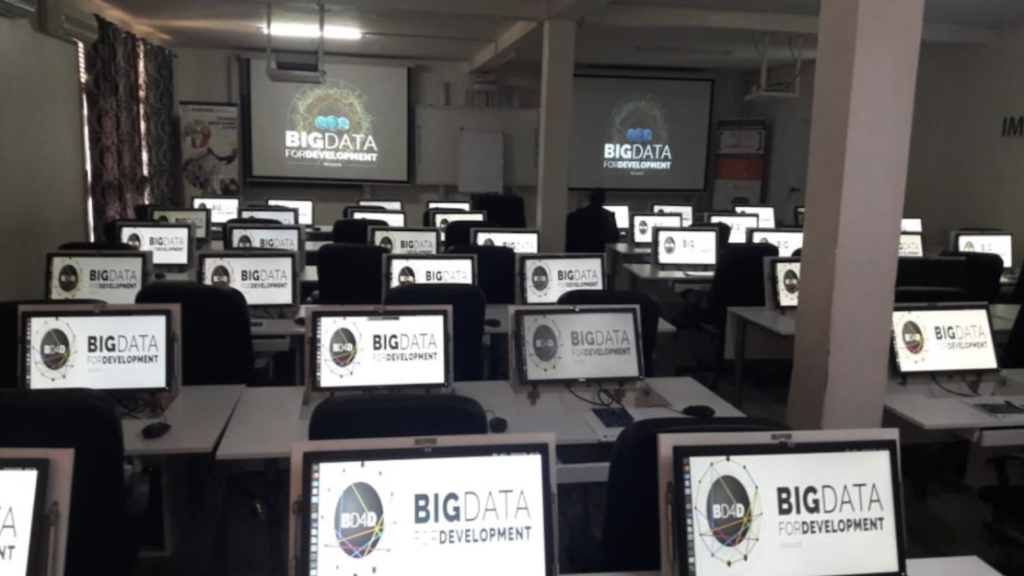
The African Institute for Mathematical Sciences – Next Einstein Initiative (AIMS-NEI)’s Industry Initiative (AII) in collaboration with the International Development Research Centre (IDRC) is implementing a two-year project titled: Harnessing Big Data to meet the Sustainable Development Goals – Building Capacity in the Global South. The aim is to increase capacity in data science and big data analytics for decision making and innovation as part of AII’s overall goal to maximise the opportunities and potential for the mathematical sciences to contribute to Africa’s economy through human capital, knowledge transfer and applied research.
The BD4D project will roll out short course to increase the number of data scientists in Africa and provide a platform for practitioners to interact, collaborate and exchange ideas. One of the short courses – to be delivered Kigali, Rwanda from 24-26 July 2019 – titled: “Leveraging the Power of Big Data (LPBD) Executive Education,” is aimed at empowering high-level business executives to learn how to leverage big data analytics to create value for their enterprises.
In today’s digital world, the use of technology has become a day-to-day business requirement. However, there are business leaders of many organizations who are unable to catch up, adopt and adjust to the speed at which technologies are being developed and deployed. According to a 2018 KPMG survey in the USA, 78 per cent of CEOs who needed to make a critical decision have overlooked data-driven insights when they were contrary to their experience.
In Rwanda, as in many parts of Africa, business leaders still have an ambivalent relationship with data when making critical decisions. In fact, a key obstacle to the growth of data science in Africa is a lack of institutional culture around the importance of data science. Some organisations simply do not understand the power of data and the role that data science can play in driving innovation and growth in a business.
Against this background, AII’s, “Leveraging the Power of Big Data (LPBD) Executive Education,” three day workshop will help business executives develop an in-depth understanding of how to capture new insights and business models through big data.
The goal of the workshop is to introduce C-level executives to the power of big data, demonstrating how big data is disrupting traditional enterprises and opening the door for the development of new products and services.
“This executive education program gives the AIMS Industry Initiative an opportunity to actively engage business leaders to prioritise on skills development in emerging technologies such as Big Data. This will help us achieve the implementation of a Skills Demand Supply Strategy that we are championing in Africa,” said Dr. Charles Lebon Mberi Kimpolo, Director of the AII.
During the three-day workshop, executives will learn how to identify, evaluate, and capture business analytic opportunities that create value. They will learn how to use big data to develop insights and predictive capabilities using machine learning, data mining, and forecasting techniques. In addition, participants will find out how the use of optimization can support decision-making in the presence of a large number of alternatives and business constraints. Finally, participants will explore the challenges that can arise in implementing analytical approaches within an organization.
The training workshop will be delivered byDr. Nikolaos Vasiloglou, the Vice-President of data science at relationalAI, and will help business leaders gain a holistic understanding of how to leverage big data to drive business results. The training emphasizes that business analytics can provide real business insights and improve the speed, reliability, and quality of business decisions. The concepts learned will help participants identify opportunities in which business analytics can be used to improve performance and will make business leaders alert to the ways that analytics can be used – and misused – within an organization.
“It has been said that data is the new oil. It took us several years until we learned how to refine oil and make it the fuel that runs our economy in a sustainable way. We are experiencing the same process with data. It took us several years of investment failures like Hadoop and ethical disasters like fake news until we learned how to make a profit from data. During the three days of training we will go through the history of the big data revolution and see how we can apply the experience so far on the African digital landscape,” said Dr. Vasiloglou.
Participation in the LPBD workshop is free and by invitation only as the number of seats is limited. All interested participants who have not been invited yet must contact the AIMS Industry Initiative team at aii@nexteinstein.org.

